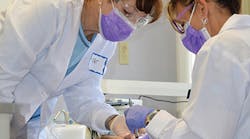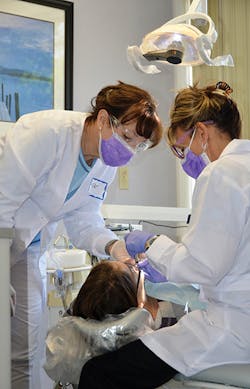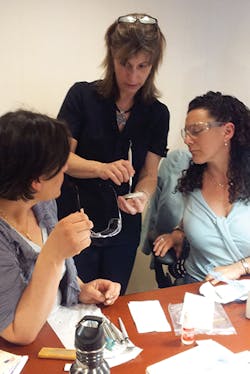Refresher courses prepare former hygienists for a return to the profession
BY Joyce Turcotte, RDH, MEd, FAADH
What happens when you reach a point in your life and desire a return to dental hygiene? Some of the reasons that hygienists step away from a career they once enjoyed and found rewarding include raising children, relocation, caring for elderly relatives, personal health issues, and changes in marital status.
So some dental hygienists eventually reflect on the question, "How do I return to a career I once enjoyed?" Lisa from Montana, for example, shared her story with me. She participated in a refresher course offered by my company. The course was "the best preparation for this whole process to get my license back."
--------------------------------------------------------------------
Other articles about dental continuing education
- Understanding CE providers
- Increasing staff functions to improve practice productivity
- By giving back, you can boost your dental hygiene career
--------------------------------------------------------------------
"I felt like I had been out of practice long enough to miss many changes and improvements," Lisa said. "Your course offered a review of things that hadn't changed, information on all the new technology and equipment, and critical clinical experience before attempting the actual board. Because of your course, I was able to walk into a dental office and feel like I had the knowledge and skills needed to provide excellent care. Your course introduced digital X-rays, computer programs for patient charts, and my new favorite instruments."
Lisa's return to the profession was a comeback effort after a bad marriage.
"I did not have the confidence to get started on my own and did not know where to start," she said. "I was in a very bad, abusive marriage. I had been isolated from family, friends, work, and any opportunity to provide for myself. I felt hopeless and desperate. Your course gave me the hope, belief, and confidence in myself to make that step to get my life back. It definitely paid off. I am on my own and providing for my two children and myself without any help from my ex-husband. He always tried to discourage me, and I did not think I would be able to get away from him. Your course gave me the knowledge, skills, abilities, courage, and strength to stand alone."
Lisa said she "literally cried" when she passed the Prometric exam. The clinical board was "very stressful because I had to find my patient."
"Thankfully, my personal dentist was very helpful," she said. "He helped me with getting X-rays, screening possible patients, and provided equipment for me to use for the actual board. I could not have done it without his help. I felt like I had the skills needed to pass this portion, but it was still a huge relief to finally get my results about a week later. I applied for jobs and started working right away. It was the best feeling to be able to go back into practice."
A North Carolina native, Lisa realized that she could now administer local anesthesia in Montana. "I did not want to feel less than the other hygienists in my office and wanted to continue to learn and practice all available to me. After your course and all your help in passing the boards to get my license back, I knew I could do this as well. I took my course online, had some clinical training time, practiced and got help from dentists and hygienists in the practice where I work, and just got my license to administer local anesthesia as well. I feel like I can do anything now!"
Lisa continued to learn as a result of her reintroduction to the profession. "I am still learning and growing each day. I never want to let all my education and abilities be wasted again. I want to continue to learn and practice all the skills I can and never stop growing!"
Hygienists contact me through referrals from schools, state boards, and dental professionals. Also, through an internet search, they can read about the course on our website. The refresher course started in 1988 when a woman contacted me and wanted to return to work as a hygienist. She kept her license but did not practice for almost 20 years. When her youngest child went away to college, she needed the extra income and realized how much she missed dental hygiene after experiencing the "empty nest syndrome."
Holly from Illinois explains her thoughts and feelings after completing the refresher course a few years ago. "Dental hygiene is a great field, but along the way in everyone's lives, circumstances change. After several years away from the field, I was ready and eager to return, but I wanted to make sure I felt confident going back to dental hygiene and could offer patients the best care. The RDH refresher program offered me that opportunity and gave me the credibility and self-assurance I needed. Beyond being a great review course, complete with its own text, and covering the latest technology, the program guided us back into the clinic and provided valuable hands-on tips. I even came away with a new favorite scaler that I hadn't been exposed to before. Rearmed with confidence, CE, and a strong reference letter, I was able to land a great position."
Factors to consider for the re-entry process or license reinstatement are: 1. Where and when you graduated2. Number of years in practice, type of practice, work environment, and quality of care and services 3. Skill levels and procedures performed in practice 4. Number of years out of practice 5. How you spent your time while away from dental hygiene 6. Continued education with relevant seminars, workshops, and clinical activity 7. What skill sets were developed since you left clinical practice |
As a business owner of a dental seminar company, a dental hygienist, and a clinic instructor, I consulted with others regarding the development of a refresher course. The college in which I was an adjunct was helpful and one of my colleagues and mentors provided guidance and support for many years.
Frequently, I talk with "lost dental hygienists," meaning they have disconnected from the profession, their alumni, and their alma maters. Without a network, they don't know where to start.
After a phone interview, recommendations are made to begin the journey to dental hygiene. Depending on their circumstances and readiness to take action, I help hygienists develop a checklist of steps to take.
Many hygienists underestimate their skill sets. During the phone interviews, I often hear, "I was a stay-at-home mom." During the conversations, though, I learn that the hygienist had served as president in various clubs or religious groups, organized events, acted as caregiver/patient advocate to a relative or friend, or managed a business. These are valuable skills a dental hygienist could bring to a private practice, public-health setting, or industry.
Refresher courses are not just for the unlicensed or out-of-practice dental hygienists. You may find yourself in a practice that is out of date or the doctor that has employed you for many years has decided to retire and sell the practice. The new doctor that just purchased the practice would like to implement proactive periodontal soft-tissue management, caries risk prevention, oral cancer screening, or use technology you are not familiar with. Perhaps you moved to a different region and learn from interviews that you are not practicing what is expected in your new community.
In an effort to update, you may not know what you don't know. Searching for continuing education classes can be a daunting task. Most often, it is clinical practice and coaching that would help you build confidence, update your resume, and make you more competitive in the marketplace.
Important topics to update are OSHA guidelines, HIPAA rules, computer software, digital imaging, current concepts in periodontal therapy, and appropriate insurance coding, data collection, and documentation. Understanding medical histories and the impact of dental treatment planning has become an expected skill of the dental hygienist. Recognizing oral and radiographic pathology and anomalies is helpful to the dentist's diagnosis and referral. Learning what is trending in caries management, oral cancer screening, restorative dentistry including implants, and the maintenance of dental treatment is important.
So many products need to be evaluated and recommended for a tailored home-care protocol, which is important to reducing and managing disease. Learning about medical conditions, premedication, and pharmacology are critical to patient safety. Becoming CPR certified and prepared for medical emergencies will be valuable to your patients and the practice. Team building and group dynamic courses will help you adapt and work well with others.
In preparation for license reinstatement, instructions for a sequence of steps are provided with counseling and coaching along the way. No one should be alone during these stages. These are big steps to take without the emotional and professional support and guidance necessary to progress through a maze of paperwork!
In closing, becoming "refreshed" in a comprehensive way is what any dental hygienist wants for a dental practice, whether pursuing employment or bringing new concepts and techniques to your patients and the dental practice. RDH
Joyce Ann Turcotte, RDH, MEd, FAADH, has been an educator and clinician for over 35 years. She is the recipient of the 2014 Philips and RDH PennWell Mentor of Distinction Award. Joyce is president of Professional Learning Services, LLC, an educational and consulting service, which has been conducting dental hygiene refresher programs since 1988. For more information, contact Joyce at [email protected]. or visit www.pls.org.








